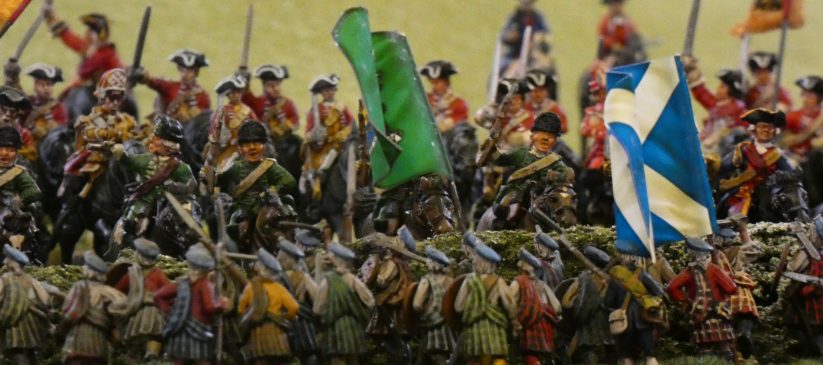
“What If?” is an interactive wargame campaign set in the aftermath of the Battle of Prestonpans in 1745. It is counter-factual, allowing free decision-making for the participants. In other words, there is no obligation for the armies in the game to follow the actual course of events in 1745-6, giving them the chance to alter the outcomes.
What’s the point?
The main objective is to have fun: it is an open-ended game, with countless possible events and actions, but it also encourages us to think about the alternative courses of action which the protagonists of history might have taken. Crucially, the game will remind us that no outcome is inevitable, and all decisions (including decision not to do something) have consequences!
How will the campaign be played?
Here at our museum, we have the master campaign map on which all armies and garrisons will be marked. Their movements will be marked by the Gamemaster (our curator, Arran). Forces will move in real-time, so armies or regiments which are on the march will take days or weeks to reach their destinations. As their opponents march in real-time too, it will be possible to intercept or evade the enemy’s forces. The armies will be directed by their government’s Council of War (see below), with the Gamemaster putting their decisions into action. Occasionally, he will also notify the Councils of unexpected events which might occur during the course of the campaign.
Who makes the decisions?
Strategic decisions for the Jacobite army – which armies march where – are taken by YOU. On our Facebook page (facebook.com/Prestonpans1745), a briefing and a poll will be posted whenever a decision needs to be made. Anyone looking at the page can vote on the poll whilst it is open, and then the majority decision will be set in motion by the Gamemaster. Periodic briefing reports will be posted on any outcomes.
Strategic decisions for the British government will be made by a closed group of volunteers. This means that some of their decisions about troop movements etc will not be known to the Jacobites.
What happens when there’s a battle?
The campaign is unlikely to be resolved without a number of skirmishes, sieges, and pitched battles. We have devised a set of rules, based on dice rolls, which will resolve some scenarios, but most confrontations will require an engagement to be fought.
Engagements will be fought out as tabletop games using 28mm miniatures painted by some of our friends. These will face one another according to the Black Powder 2 rule-set. These games will be held in our Museum, hopefully whilst we are open so that visitors can observe them (or even have a go themselves!). The gamemaster will oversee the results of the engagements and reflect the outcomes on the campaign map. Battle reports will be posted on Facebook and YouTube.
Where does it start?
The campaign begins on 21 September 1745 (21 January 2023!), immediately after the Battle of Prestonpans. The Jacobites will be in possession of the city of Edinburgh but not the castle, and will need to decided what to do next… They might want to consolidate and expand their control in Scotland, but the longer they wait the more troops build up in England to counter them. The gamemaster will manage the systems for recruitment which will allow the armies to grow over time.
How will it end?
We don’t know! The decisions made by the Facebook polls and the outcomes of the battles will determined in what directions the campaign goes. In certain circumstances, for example, the French might send an invasion force to support the Jacobites. Perhaps the whole conflict will be contained within Scotland, or maybe it will spread into England and Wales? It might last six weeks or six months, maybe even longer! If there is a definitive outcome – the Jacobites taking London, or their armies being utterly destroyed, then that will be a clear ending. But if the two sides have fought to a standstill, perhaps the gamemaster will need to propose a negotiated settlement!
After the game’s conclusion, we’ll be able to look back and see where the critical turning points were and consider them in relation to what happened historically. It will be interesting to see what happens…